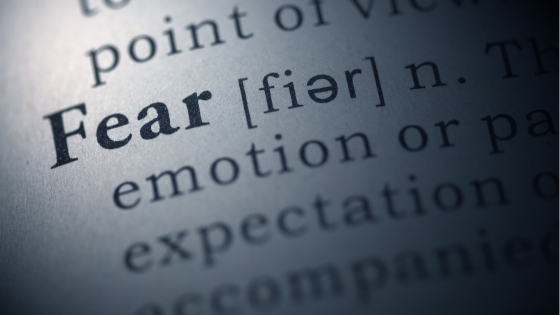What is Fear?
Fear is both an emotional and instinctual response. For example, a car is speeding towards you and you fear that the car will hit you. Instinctively you move out of the way. Instinct can protect you physically and mentally. You are considering dating someone and you discover they lied to you, so you decide to end the relationship to avoid further hurt and betrayal. Fear is a natural emotion that seeks to protect our physical and mental being. It is important to distinguish between real fear (threats against physical and mental safety) and unrealistic fear.
For the purpose of this post we are going to explore unrealistic emotional fear. This post is inspired by the bible verse 1 John 4:18 which states:
There is no fear in love. But perfect love drives out fear, because fear has to do with punishment. The one who fears is not made perfect in love.
In this verse it points out that fear is linked with punishment. In other words, fear is the product of punishment or perceived punishment, the illusion of negative consequences. In life, every action results in a negative or positive consequence. Fear creeps in when there is a belief that your actions will result in a negative consequence. When we experience negative consequences, we equate them to punishment for wrong action. Fear results in actions of retreat, surrender, defeat, inaction, and regret.
Key Words
Fear: to be afraid; to expect or worry about.
Afraid: filled with concern or regret over an unwanted situation.
Worry: to think about problems or fears; to feel or show concern because you think that something bad has happened or could happen.
When we examine the definition of the words fear, afraid, and worry, they all share the common idea of expecting the worst; a negative or unwanted consequence. At the core, these words describes a belief system, or negative thinking pattern; a doom and gloom mentality. Therefore, fear can lead to negative thinking patterns causing you to expect the worst. Always expecting the worst can lead a person to inaction. It can cause a person to react or overreact in a situation resulting in more negative consequences. Experiencing more negative consequences (the result of trying to avoid negative consequences) affirms the negative belief system that triggered the initial fear.
 What love got to do with it?
What love got to do with it?
The original inspiration was the bible verse that stated perfect love drives out fear. The bible also describes love, stating:
Love is patient, love is kind. It does not envy, it does not boast, it is not proud. It does not dishonor others, it is not self-seeking, it is not easily angered, [and] it keeps no record of wrongs. Love does not delight in evil but rejoices with the truth. It always protects, always trusts, always hopes, [and] always perseveres. Love never fails. – 1 Corinthians 13:4-8
If fear is the result of punishment, then the opposite is love. Love is result of kindness which is associated with positive consequences. If we loved ourselves and others the way this verse describes it will lead to positive results. It produces hope and a willingness to engage in life. Fear is expecting the worst and love is expecting the best. Key concept is expectation; expectation is the belief system or thinking pattern. You can choose the belief system of fear or of love. That is not to say that you will not experience negative things and emotions in life. It is what you choose to believe about the situation that makes the difference.
 How to Overcome Fear
How to Overcome Fear
Address the negative thinking systems that are causing you to expect the worst.
Find the root of the problem. For example, you fear trying something new. At the core of this fear is expecting that you will fail. Failing may result in embarrassment, humiliation, a waste of time, and a million other negative consequence you can think of. So dig a little deeper, why is failure triggering a fear response? It could be because the last time you tried something new you failed and was embarrassed. The failure may have triggered feelings of incompetence or inadequacy. So you decided to avoid trying new things so that you will not feel inadequate. Here is an example of a negative thinking pattern:
failure = inadequacy = Negative belief “I am not good enough.”
The solution to this would be to shift your belief or thinking to reflect self-love and self-acceptance. Be kind to yourself. It is not as bad as your mind is trying to convince you. Fear awefulizes events and exaggerates. Think about positives that counter or disprove negative thinking patterns. Keeping with the failure example, reflect on another time your may have failed, did it kill you. Have you recovered from it. Here are some examples of self-loving and self-accepting thinking patterns:
Self-loving belief “I may have failed but, my failure does not define me.”
Self-accepting belief “I failed and that is okay, I have the ability to learn and become better.”
Fear can cause you to retreat and hide or it can cause you to reevaluate, develop a plan and try again. Talk to yourself, challenge those fears, and negative thoughts. Take control over your mind. Learning to control your thinking is a very positive thing. It’s okay! Talking to yourself doesn’t make you crazy. Letting fear hinder you from living authentically and boldly in your purpose….. now that is crazy! Angenette Crume and Arise Beautiful can help you build the confidence to break through you fears. We can help you retrain your thinking. Book a session with Angenette or check out some addition resources. She would love to help you overcome your fears.
Inspiration in your inbox!
Need a little pick me up from time to time. Sign up for the newsletter designed to provide words of encouragement to boost self-esteem.


